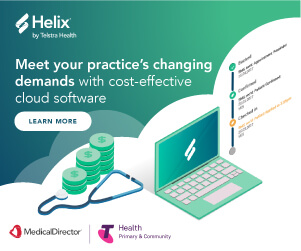Four ways to future-proof your health IT plan
Current technology trends are placing increasing pressure on the healthcare sector to keep up in order to remain efficient, streamlined and agile. But with the rise of cloud computing, AR and robotics, recent reports have shown healthcare organisations are still unprepared for the change. In this article, we take a look at four key ways you can future-proof your healthcare IT infrastructure.
Switching from on-premise to cloud-based solutions
There is increasing evidence pointing to an increase in cloud-uptake by organisations globally, and more healthcare providers serious about future-proofing their IT infrastructure are now switching to the cloud.
“By 2030, cloud technologies will be so embedded that memories from the pre-cloud era will feel positively archaic by comparison,” the Realizing 2030 survey, stated.
Cloud-based clinical management solutions offer flexibility, scalability and speed, while keeping security a priority. Meanwhile with increasing use of mobile devices in healthcare, cloud offers the ability to be accessible anywhere, anytime and on any device, minimising the inefficiencies and rigidity of on-premise systems.
Automating workflow management
Fax, paper and outdated workflow systems are a major frustration for GPs, and with fax still as one of the main methods of communication between all healthcare professionals, the status quo simply won’t keep up with the rapid pace of technology.
“The more automated services we put into place, like streamlining bookings, automated reminders, systems that automatically text patients, solutions like HotDoc– all of these can help a lot,” Dr Charlotte Middleton, GP and Chief Medical Advisor at MedicalDirector, says. “We need to digitise our records more and think about increasing our interoperability between healthcare professionals and institutions.”
Vigilant data security measures
Sensitive patient data is becoming an increasing hot topic, and with new laws now in place tackling cyber security breaches, the pressure is on healthcare providers to invest in more robust, protected data management and storage solutions.
For professional healthcare providers, strengthening data protection benefits everyone, including and helps to reduce the risk of regulatory burdens, financial losses, damaged reputation, and loss of patient trust. All healthcare providers need a proactive approach when it comes to managing personal information and develop a culture ingrained in data privacy, ensuring that any patient information collected is treated as an asset to be protected and managed with the utmost care.
Embracing interoperability
Already, interoperability and data exchange are driving technology buying decisions for 36 per cent of healthcare organisations, according to the 2017 Health IT Purchasing Intentions Survey.
But MedicalDirector’s recent whitepaper, Interoperability in healthcare: Synergising an industry, found while interoperability is paramount to an efficient system of care as well as more accurate patient diagnoses, there is some reluctance and fear around embracing technological change.
MedicalDirector’s whitepaper revealed a range of significant benefits of cloud-based health solutions in enabling greater interoperability. It found cloud solutions provide the digital infrastructure needed to effectively coordinate patient-centred care, while interoperability facilitates the transition to healthcare that becomes the shared responsibility of the patient and practitioner.
To find out more, download our free ebook: ‘The Smart Guide to Starting a Medical Practice.’









